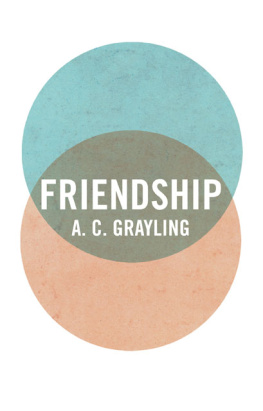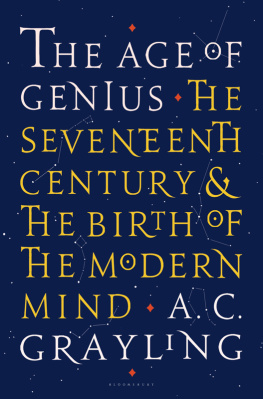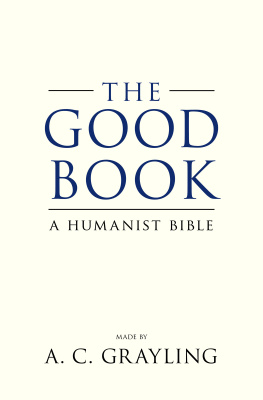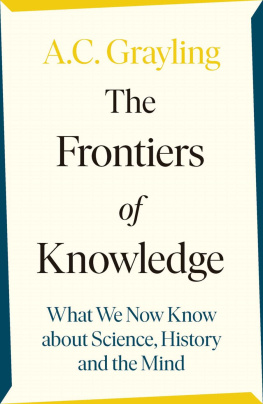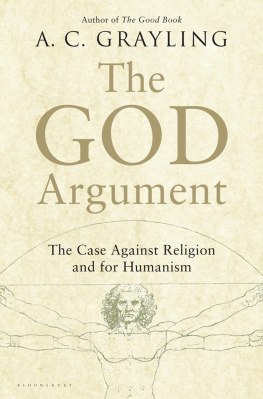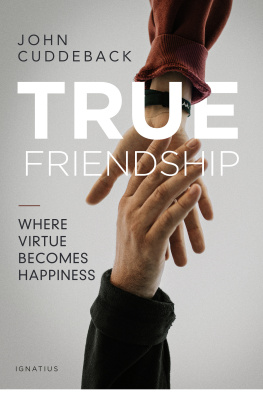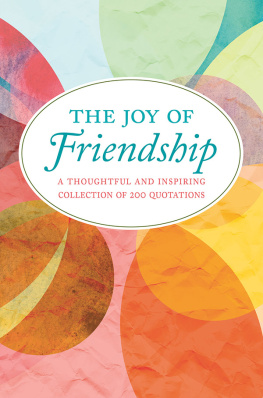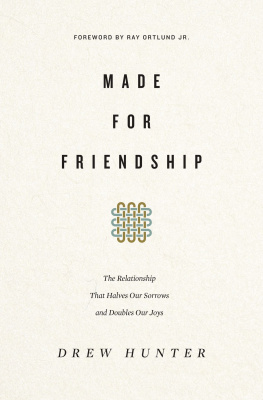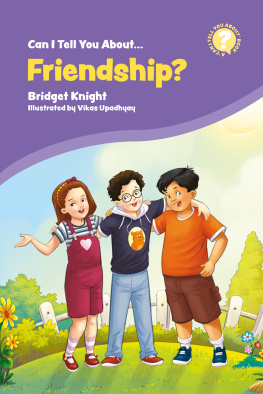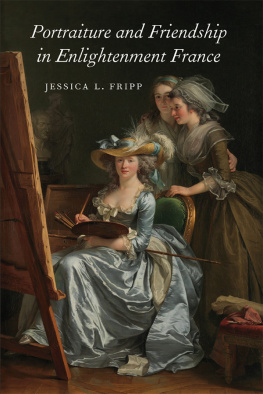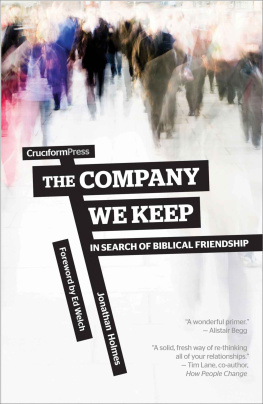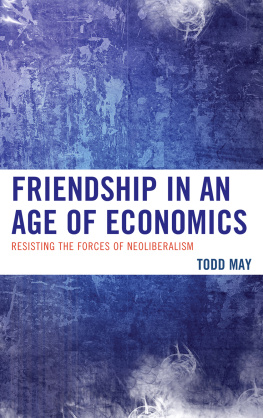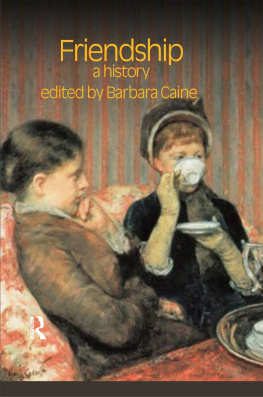

VICES AND VIRTUES
Series editors Richard G. Newhauser and John Jeffries Martin
Copyright 2013 A. C. Grayling
All rights reserved. This book may not be reproduced in whole or in part, in any form (beyond that copying permitted by Sections 107 and 108 of the U.S. Copyright Law and except by reviewers for the public press) without written permission from the publishers.
For information about this and other Yale University Press publications, please contact:
US office:
Europe Office:
Set in Sabon MT by IDSUK (Data Connection) Ltd
Printed in Great Britain by TJ International Ltd, Padstow, Cornwall
Library of Congress Cataloging-in-publication Data
Grayling, A. C.
Friendship / A. C. Grayling.
pages cm
ISBN 978-0-300-17535-6 (cloth : alk. paper)
1. Friendship. I. Title.
BJ1533.F8G625 2013
177'.62dc23
2013021868
A catalogue record for this book is available from the British Library.
10 9 8 7 6 5 4 3 2 1
amare curare sentire refovere osculari oblectare tangere fortunare
Contents
Acknowledgements
My thanks go to Dr Hannah Dawson, who read the manuscript and made illuminating comments, Tosca Lloyd, who researched the references and bibliography, my other colleagues and students at the New College of the Humanities, London, the librarians at the University of London library, the London Library, the British Library, and the editorial staff at Yale University Press, for help and many acts of friendship ranging from the practical to the inspirational.
Foreword
Richard G. Newhauser and John Jeffries Martin
It is altogether fitting that the series Vices and Virtues should begin with Friendship. As A. C. Graylings inaugural volume amply demonstrates, friendship describes the finest of human relationships: a lasting bond that transcends whatever accidental or utilitarian reasons might have brought two people together in the first place. One can debate with a friend without quarrelling; one can argue with a friend as a matter of discussion, not dissension. This is, of course, the presupposition of Socratic dialogue; it underlies any idea of progress in politics as well. And opening this kind of reasoned debate on matters of contemporary ethics is one of the goals of our series. But this is not to say that the virtue of friendship is a matter of Platonic realism: it has a history, and that history, as Grayling observes, has led to debates about what exactly constitutes friendship or, at times, whether individual friendship should be given preferential treatment in the network of relationships in a community. The history of ethical conceptions, their varying valences in changing social and cultural situations, constitutes another important element in the goals of the series that begins with this volume.
Vices and Virtues will come to constitute a library of ways of thinking historically about ethics. For our age, ethical thought is no longer comprehensible through foundational arguments; rather, ethics is most fruitfully approached historically, with sensitivity to the social, political and cultural contexts that shape moral values and lead to new moral visions over time. One of the most challenging aspects of a history of ethics is that moral values often stand in tension with the culture in which they emerge. A particular theory of justice, for example, may challenge the very structures of the society in which it is first articulated. A concept of individual friendship may be at variance with the universal aspirations of Christian agape. Thus, not only does ethics have a history; the relation of ethics to history is a subject rich in the possibility of intellectual discovery. Moreover, this is a realm of enquiry that cries out for exploration especially at a time such as our own when the language of morality is manifestly in need of precision. One has only to listen to the word friend in the mouth of contemporary politicians referring to someone in a different party to see both how expected, even desired, the discourse of friends seeking solutions to political problems is today, and how hollowed out the idea of this virtue has become in the arena of politics.
The key terms in the title of the series are used in an expansive sense to bring to the foreground a set of topics that is of contemporary interest. Readers of the series might expect to find books devoted to traditional vices such as lust, lying and envy, or traditional virtues such as faith, justice and hope, but they can also expect to see volumes devoted to issues not normally included in the traditional lists. What will give unity to the series is its commitment to examine moral issues from a historical perspective, with attention to how the cultural understanding of each category has shifted over time. But what the reader can also expect in contributions to Vices and Virtues are volumes in which clarity, breadth of vision, and especially the talent to engage a broad range of readers in reasoned discourse are essential elements. One can find no better example of all these elements than A. C. Graylings analysis of friendship and its history.
Introduction
The highest and finest of all human relationships is, arguably, friendship. Consider the fact that we regard it as a success if we become friends with our parents when we grow up, our children when they grow up, our classmates or workmates even as they remain classmates or workmates, for in every such case an additional bond comes to exist, which transcends the other reasons we entered into association with those people in the first place.
And of course our friendships with people who do not fall into one of these categories that is, our friendships with people who were strangers beforehand are special in a different and typically less complicated way, because they are purely elective; we meet someone and take a liking to him or her which is reciprocated, and thereafter we enjoy each others company, laugh together, share interests and views, and over time come to feel that we are part of the fabric of each others worlds, a valuable part, so that we develop a mutual sense of obligations owed and trust given, and meet each others needs for boon companionship, comfort, confidences and sharing. And we do all this to such an extent that if we lose such a friend we feel the loss deeply, as of someone loved. Indeed we talk of loving our friends, or some of the closer among them anyway, and their loss can accordingly be profound.
When I think of the friends I had when young, and of the friends made in the course of work and endeavour, of the evenings in their company or on long journeys, of the things learned and shared with them, of the burdens halved and the sorrows comforted and above all the laughter enjoyed, I realise that it is only the supremest moments of the intimacy of love that can compare in value to friendship and even then we hope that, in the ideal, the former will be a prelude to the latter for the rest of our days.
Different people provide the friendship we need at different times in our lives, even if certain very particular friends stay the whole course. This is a reflection of the fact that most people change with time and experience, and since all parties to a friendship are changing simultaneously, it is not surprising that they might eventually drift apart. In adult life such drift is accelerated when people take sides with one of a divorcing pair and sometimes people who were friends with a couple lose touch with both of them when they separate.
Next page
